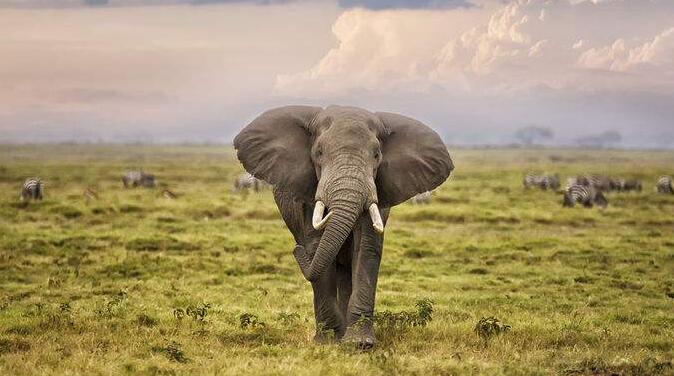(单词翻译:单击)
听力文本
Increased Illegal Hunting in Parts of Asia, Africa
In parts of the developing world, coronavirus safety measures have fueled concerns about an increase in illegal hunting of wild animals.
Some people say the hunting is a result of food shortages and an easing of law enforcement in some wildlife protection areas. Yet at the same time, border closures and travel restrictions have slowed illegal trade of some high-value animal species.
Economic problems and food shortages have created situations in which more people have been attacking rare or endangered species.
This kind of poaching is a big concern in parts of Asia and Africa.
On May 9, a greater one-horned rhinoceros was killed in India's Kaziranga National Park – the first such case in over a year. Three people were arrested on June 1. They are suspected of being part of an international group of poachers. The three had automatic rifles and ammunition at the time of their arrest, said Uttam Saikia, a wildlife warden.
As in other areas, poachers in Kaziranga pay needy people small amounts of money to help them. With families losing work during the coronavirus lockdown, the poachers "will definitely take advantage" of the situation, warned Saikia.
The case of the rhino is not the only one in India.
Since India's government announced the lockdown, poachers have killed at least four tigers and six leopards, the Wildlife Protection Society of India said recently. But poachers also killed many other animals, including gazelles, squirrels, boars, and birds.
"It is risky to poach," said Mayukh Chatterjee, a wildlife biologist, "but if pushed to the brink, some could think those risks are worth taking."
Chatterjee works for the Wildlife Trust of India, a not-for-profit group.
India is not the only country to see an increase in poaching.
In Nepal, more forest-related crimes were reported in the first month of lockdown than at any time over the past 11 months. That information comes from a study by Nepal's government and the World Wildlife Fund.
In Southeast Asia, the Wildlife Conservation Society confirmed the killing of three critically endangered giant ibises for the bird's meat. In late March, more than 100 painted stork chicks were also poached in Cambodia.
"Suddenly rural people have little to turn to but natural resources and we're already seeing a spike in poaching," said Colin Poole, the society's director for the Greater Mekong.
In Africa, organized poaching has not increased much, partly because many parks and wildlife reserves have continued ranger patrols.
Ray Jansen is the chairman of the African Pangolin Working Group. He said bushmeat poaching had increased, especially in parts of southern Africa. "Rural people are struggling to feed themselves and their families," he added.
At the same time, border closures and travel restrictions have slowed international trade in pangolins and other animals. But the illegal trade continues within Africa, noted Jansen. He added that he expected a "flood of trade" once shipping opens up again.
Concerned about a possible link between the bushmeat trade and the coronavirus, several wildlife groups are calling for governments to enact measures to avoid future pandemics. Among them is a ban on the sale of wild birds and animals for food.
Others are calling for changes to the international treaty known as CITES, which restricts the trade in endangered plants and animals. They say CITES should be expanded to include public health concerns. They note that some commonly traded animals often carry viruses but are currently not subject to trade restrictions under the treaty.
I'm John Russell.
重点解析
1.restrictions 限制
Officials have eased up on the press restrictions.
官员们已经放松了对新闻界的限制。
2.treaty 公约条约
The parliaments of Australia and Indonesia have yet to ratify the treaty.
澳大利亚和印度尼西亚的国会尚未批准该条约。
3.endangered 濒临灭绝的
Many measures have been taken to save endangered wildlife in China.
中国已经采取了许多措施来挽救濒危的野生动物。
4.expanded 扩展的
The French empire had expanded largely through military conquest.
法兰西帝国的扩张主要靠军事征服。
5.He added that he expected a "flood of trade" once shipping opens up again.
open up 开发;开放
Three armed men were waiting when the postmaster and his wife arrived to open up the shop.
当邮政局长和妻子到邮局开门营业时,3名持械男子正等着他们。
Lorna found that people were willing to open up to her.
洛娜发现人们愿意对她畅所欲言。
6.Some people say the hunting is a result of food shortages and an easing of law enforcement in some wildlife protection areas.
food shortages 食物短缺
Food shortages often occur in time of war.
在战争期间常常发生粮食短缺的情形。
Food shortages forced many townspeople into the country to grow their own food.
食物短缺迫使很多市民到农村自己种粮食。
参考译文
亚非部分地区非法狩猎活动增加
在一些发展中国家,为限制冠状病毒而制定的安全措施加剧了人们对非法捕猎野生动物活动增加的担忧。
一些人表示,狩猎是食物短缺和一些野生动物保护区执法不力的结果。但与此同时,边境关闭和旅行限制减缓了一些高价值动物物种的非法贸易。
经济问题和粮食短缺导致越来越多的人攻击稀有或濒危物种。
在亚洲和非洲的一些地区,这种偷猎活动引起了广泛关注。
5月9日,印度卡齐兰加国家公园的一只大独角犀牛被杀——这是一年多来首次发生此类案件。6月1日,有3名涉案人员被逮捕。这些人疑是国际偷猎组织的成员。野生动物管理员乌藤·萨琪亚表示,三人被捕时均持有自动步枪和弹药。
与其他地区一样,卡齐兰加的偷猎者也会向需要帮助的人提供少量的金钱。萨琪亚警告称,由于疫情封锁期间,很多家庭成员失业,偷猎者“一定会利用”这一时机。

犀牛被杀并不是印度唯一的案例。
最近印度野生动物保护协会称,自从印度政府宣布封锁以来,偷猎者至少已杀害4只老虎和6只豹子。偷猎者还杀害了许多其他动物,包括瞪羚、松鼠、野猪和鸟类。
“偷猎有风险,”野生生物学家玛尤赫·查特吉说,“如果不是万不得已,一些人可能认为值得去冒这些风险。”
查特吉在非盈利组织印度野生动物基金会工作。
印度不是唯一一个出现偷猎活动增加的国家。
尼泊尔封锁的第一个月内就报告了多起与森林有关的犯罪,且数量高于过去11个月的任何时候。这一信息来自尼泊尔政府和世界野生动物基金会的一项研究。
在东南亚,野生动物保护协会证实,三只濒临绝种的巨朱鹭被捕杀,目的是为了食用它们的肉。3月下旬,柬埔寨也有100多只彩绘鹳雏鸟被偷猎。
大湄公河协会理事科林·普尔说:“突然,农民走投无路,只能把手伸向大自然,我们已经看到偷猎活动的激增。”
在非洲,有组织的偷猎活动并没有显著增加,部分原因是许多公园和野生动物保护区仍在继续进行护林巡逻。
雷·詹森是非洲穿山甲工作组主席。他说,丛林肉食偷猎活动有所增加,特别是在非洲南部一些地区。他还指出:“农民在千方百计地养活自己和家人”。
与此同时,边境关闭和旅行限制减缓了穿山甲和其他动物的国际贸易活动。但詹森指出,非洲境内的非法贸易仍在继续。他补充说,他预计航运业一旦恢复,将出现“大量动物贸易”。
由于担心丛林肉类贸易和冠状病毒之间可能存在联系,一些野生动物组织呼吁各国政府采取措施,避免未来的大流行病。其中包括禁止将野生鸟类和动物作为食品出售。
另一些人则呼吁修改名为《濒临绝种野生动植物国际贸易公约》(CITES)的国际条约,该条约旨在限制濒危动植物的贸易。他们指出,该公约应该扩大范围,扩展至公共卫生问题,并指出一些经常用于交易的动物通常携带病毒,但目前不受该条约规定的贸易限制。
约翰·罗塞尔为您播报。
译文为可可英语翻译,未经授权请勿转载!


